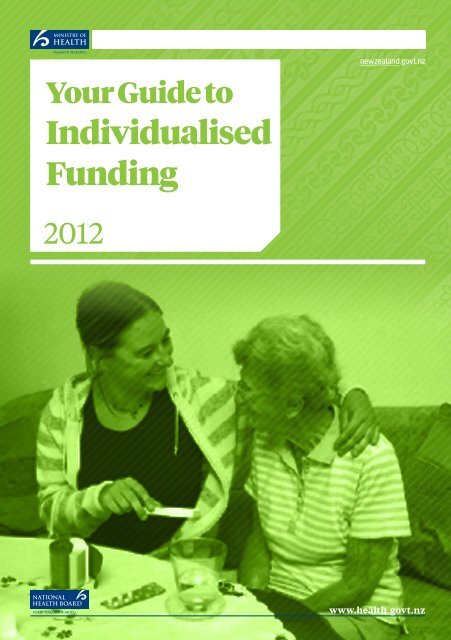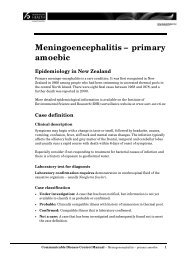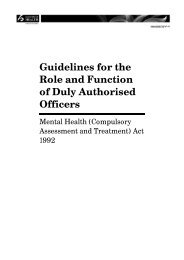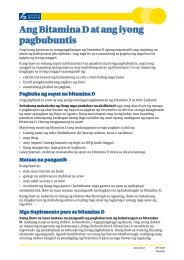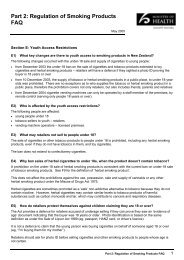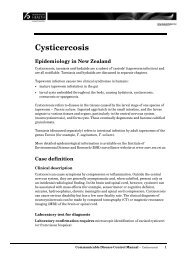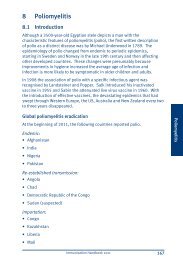Your Guide to Individualised Funding (pdf, 931 KB) - Ministry of Health
Your Guide to Individualised Funding (pdf, 931 KB) - Ministry of Health
Your Guide to Individualised Funding (pdf, 931 KB) - Ministry of Health
You also want an ePaper? Increase the reach of your titles
YUMPU automatically turns print PDFs into web optimized ePapers that Google loves.
<strong>Your</strong> <strong>Guide</strong> <strong>to</strong><br />
<strong>Individualised</strong><br />
<strong>Funding</strong><br />
2012<br />
www.health.govt.nz
Citation: <strong>Ministry</strong> <strong>of</strong> <strong>Health</strong>. 2012. <strong>Your</strong> <strong>Guide</strong> <strong>to</strong><br />
<strong>Individualised</strong> <strong>Funding</strong>.<br />
Welling<strong>to</strong>n: <strong>Ministry</strong> <strong>of</strong> <strong>Health</strong>.<br />
Published in May 2012 by the <strong>Ministry</strong> <strong>of</strong> <strong>Health</strong><br />
PO Box 5013, Welling<strong>to</strong>n 6145, New Zealand<br />
ISBN 978-0-478-39306-4 (print)<br />
ISBN 978-0-478-39307-1 (online)<br />
HP 5468<br />
This document is available at:<br />
www.health.govt.nz
What is <strong>Individualised</strong> <strong>Funding</strong>?<br />
<strong>Individualised</strong> <strong>Funding</strong> (IF) is a way <strong>of</strong> paying for disability support<br />
services. IF enables disabled people <strong>to</strong> directly manage the hours they<br />
are allocated for Home and Community Support Services. This can<br />
range from simply choosing support workers and planning how best <strong>to</strong><br />
use the hours <strong>of</strong> support, <strong>to</strong> employing support workers and managing<br />
all aspects <strong>of</strong> the service delivery.<br />
IF is administered through a contracted IF Host.<br />
IF is available for people who:<br />
> meet the Disability Support Services Group’s definition <strong>of</strong> being<br />
disabled, and have been allocated Home and Community support<br />
Services by their local NASC agency<br />
> have had a discussion with the NASC <strong>to</strong> determine if IF is a suitable<br />
option for them.<br />
IF can only be accessed via a referral from a NASC.<br />
If the person wants <strong>to</strong> manage their support services through IF (or has<br />
someone in their support network who can take on this responsibility),<br />
then a referral can be made <strong>to</strong> the person’s preferred IF Host.<br />
What can be purchased using<br />
<strong>Individualised</strong> <strong>Funding</strong>?<br />
IF can be used <strong>to</strong> purchase support services provided by support<br />
workers, (employees or contracted personnel or organisations), and<br />
costs relating <strong>to</strong> the employment <strong>of</strong> support workers.<br />
Although other <strong>Ministry</strong> funded disability support services can be<br />
allocated by the NASC as part <strong>of</strong> a wider support package, IF cannot be<br />
used <strong>to</strong> manage services such as:<br />
> day and/or vocational services<br />
> rehabilitation services<br />
> supported living<br />
> respite provided in <strong>Ministry</strong> contracted facilities<br />
<strong>Your</strong> <strong>Guide</strong> <strong>to</strong> <strong>Individualised</strong> <strong>Funding</strong> 3
carer support<br />
> residential services in <strong>Ministry</strong> contracted facilities<br />
> information and advisory services<br />
> equipment or housing modifications<br />
> child development services<br />
> behaviour support services.<br />
These services will continue <strong>to</strong> be funded separately.<br />
What will be <strong>of</strong>fered by <strong>Individualised</strong><br />
<strong>Funding</strong> Hosts?<br />
Under IF the Host Provider will <strong>of</strong>fer a menu <strong>of</strong> services. These can<br />
broadly be categorised in<strong>to</strong> the following:<br />
Service Level 1<br />
> The provision <strong>of</strong> IF set-up and coaching. This includes helping<br />
disabled people <strong>to</strong> set up their service and supporting them <strong>to</strong><br />
understand and manage their responsibilities.<br />
> The provision <strong>of</strong> an invoicing mechanism allowing disabled people <strong>to</strong><br />
authorise the IF Host <strong>to</strong> make payments <strong>to</strong> and invoice the <strong>Ministry</strong><br />
for support hours used.<br />
> Moni<strong>to</strong>ring and reporting <strong>to</strong> the <strong>Ministry</strong> in relation <strong>to</strong> the support<br />
services delivered and the quality <strong>of</strong> those services.<br />
> Establishment <strong>of</strong> networks for disabled people using IF <strong>to</strong> enable peer<br />
support, sharing <strong>of</strong> information, and sharing <strong>of</strong> resources such as<br />
staff, staff training or a bureau function.<br />
Service level 1 is <strong>to</strong> be provided by the IF Host <strong>to</strong> all disabled people<br />
who choose IF as a way <strong>to</strong> purchase their Home and Community<br />
Support Service supports (HCSS).<br />
IF Host Providers may <strong>of</strong>fer additional service options (at additional<br />
costs) <strong>to</strong> suit individual needs. People should discuss with their NASC<br />
about choosing an appropriate IF Host that will suit how they wish <strong>to</strong><br />
manage their supports. Examples <strong>of</strong> these additional service options<br />
are given below.<br />
4<br />
<strong>Your</strong> <strong>Guide</strong> <strong>to</strong> <strong>Individualised</strong> <strong>Funding</strong>
Service Level 2<br />
The provision <strong>of</strong> a payroll mechanism allowing disabled people <strong>to</strong><br />
authorise their IF Host <strong>to</strong> employ the support workers chosen by them<br />
and <strong>to</strong> make payments <strong>to</strong> support workers directly. The provision <strong>of</strong><br />
a payroll system will include management <strong>of</strong> ACC, tax and Kiwisaver<br />
obligations on behalf on the disabled person.<br />
Service Level 3<br />
The provision <strong>of</strong> other functions associated with employing staff. These<br />
functions may include recruitment, staff training, a bureau function<br />
and membership <strong>of</strong> associations.<br />
Costs<br />
Payment <strong>of</strong> fees <strong>to</strong> Host Providers<br />
For services delivered under Service Level 1, IF Hosts charge<br />
individuals at a rate that has been set by the <strong>Ministry</strong>. This is<br />
determined by the size <strong>of</strong> the support package allocated by the NASC.<br />
Charges for additional service options beyond Service Level 1 can be<br />
determined by the IF Host. Payment <strong>to</strong> the IF Host is calculated as a<br />
percentage <strong>of</strong> the <strong>to</strong>tal cost <strong>of</strong> support delivered.<br />
Responsibilities under IF<br />
Increased flexibility and control over who, when and where support<br />
services are delivered are some <strong>of</strong> the benefits <strong>to</strong> enjoy when managing<br />
your own support services under IF.<br />
It is also important <strong>to</strong> point out that there are responsibilities and<br />
accountabilities for those individuals who use IF, which will include:<br />
> maintaining records <strong>to</strong> sufficiently detail how those support services<br />
have been used<br />
> complying with relevant <strong>Ministry</strong> policies.<br />
Other responsibilities include those associated with employment <strong>of</strong><br />
and managing staff and complying with relevant tax and employment<br />
laws and regulations.<br />
<strong>Your</strong> <strong>Guide</strong> <strong>to</strong> <strong>Individualised</strong> <strong>Funding</strong> 5
How IF works<br />
Support<br />
services are<br />
delivered<br />
Support services<br />
verified by person<br />
and IF Host notified<br />
6<br />
Needs Assessment/Service<br />
Coordination completed and<br />
IF discussed as an option<br />
Implementation<br />
<strong>of</strong> ISP and<br />
engagement<br />
<strong>of</strong> support staff<br />
begins<br />
Person and IF<br />
Host agree on<br />
level <strong>of</strong> support<br />
needed<br />
Person and IF<br />
Host work<br />
<strong>to</strong>gether <strong>to</strong><br />
develop ISP<br />
IF Host invoices<br />
<strong>Ministry</strong> <strong>of</strong> <strong>Health</strong><br />
<strong>Your</strong> <strong>Guide</strong> <strong>to</strong> <strong>Individualised</strong> <strong>Funding</strong><br />
Person chooses IF<br />
Host from list and<br />
NASC makes referral<br />
Person and<br />
proposed IF<br />
Host discuss<br />
options<br />
IF Host receives<br />
funds and makes<br />
payments for<br />
supports delivered
Glossary<br />
Household Management<br />
Services which help a disabled person <strong>to</strong> maintain, organise and control<br />
their household/home environment. This includes but is not limited <strong>to</strong>:<br />
> meal preparation, shopping, laundry, cleaning.<br />
IF Host<br />
A (contracted) <strong>Ministry</strong> <strong>of</strong> <strong>Health</strong> provider who will provide the<br />
<strong>Individualised</strong> <strong>Funding</strong> Scheme <strong>to</strong> disabled persons.<br />
Individual Service Plan (ISP)<br />
A plan agreed with the person that specifies how the goals identified in the<br />
Support Plan will be met.<br />
Needs Assessment and Service Co-ordination organisations (NASC)<br />
These organisations are funded by the <strong>Ministry</strong> <strong>of</strong> <strong>Health</strong> <strong>to</strong> assess the<br />
person’s needs, and then <strong>to</strong> coordinate other services <strong>to</strong> meet these needs.<br />
Nominated agent, family or whānau member<br />
An individual who is able <strong>to</strong> make decisions on behalf <strong>of</strong> the disabled<br />
person that relate <strong>to</strong> the management <strong>of</strong> the persons supports.<br />
Person/People<br />
A person who is eligible for support services funded by the Disability<br />
Support Services Group. This may also include the family/whānau at the<br />
person’s request or their nominated agent.<br />
Personal Care<br />
Help with activities <strong>of</strong> daily living that enables a disabled person <strong>to</strong><br />
maintain their functional ability at an optimal level.<br />
Service Level 1<br />
The minimum level <strong>of</strong> services, IF Hosts are expected <strong>to</strong> provide <strong>to</strong><br />
disabled persons as a way for them <strong>to</strong> manage their own support services.<br />
Service options<br />
Additional service levels that IF Hosts can <strong>of</strong>fer people (and charge for), as<br />
part <strong>of</strong> a menu <strong>of</strong> services under <strong>Individualised</strong> <strong>Funding</strong>.<br />
Support Plan<br />
A plan agreed with the NASC and the person that specifies their overall<br />
Goals and Type or Amount <strong>of</strong> Services. The Services will be specified as<br />
Core Services and Other Services.<br />
<strong>Your</strong> <strong>Guide</strong> <strong>to</strong> <strong>Individualised</strong> <strong>Funding</strong> 7


